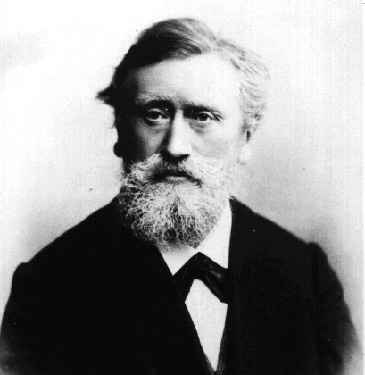| Profile | Major Works | Resources |
Karl Knies, 1821-1898.

![]()
Karl Gustav Adolf Knies (sometimes spelled Carl Knies) was one of the leading members of the "older generation" of the German Historical School.
Karl Knies was educated the University of Marburg, graduating in 1846 with a thesis on ancient Roman history, and stayed on as a lecturer, often filling in for Bruno Hildebrand. Knies was involved in the planning of a Polytechnic School in Cassel, but political denouements after 1848 led to his temporary exile. Knies spent sometime teaching at the high school of Shaffhausen (Switzerland), before returning to Germany in 1855, taking up the professorship of cameralistics at the University of Freiburg in Baden.
In 1865, Karl Knies moved to the University of Heidelberg, succeeding Karl Heinrich Rau. in that prestigious professorial chair. Knies would remain at Heidelberg for the rest of his career.
In his famous 1846 thesis at Marburg, elaborated in his 1853 book, Karl Knies posited a "linear stages" theory, which spoke of "moral progress" which would render most theories obsolete. Knies argued that economics straddled the interface between natural forces (Naturwissenschaften) and human action (Geisteswissenschaften). Contrary to Roscher's aspirations, Knies argued that economic "laws" cannot be treated in terms of natural science given the preponderance of the irrational and the subjective in human action (which guides the economy). Consequently, the so-called "laws" of economics are merely "laws of analogy". The historicist method, Knies argued, is the only one available to elucidate this. Knies's defense of the historical methodology on logical (as opposed to empirical) grounds was severely criticized by Schmoller and Weber.
Knies was a relentless critic of Classical economics and a strident opponent of Socialist movements. In his 1857 work, he was perhaps the first to examine the economic role of commercial "advertisements". His 1873 work on money and credit, however, contained little of the historical method in it.
After teaching for a while at Freiburg, Karl Knies became a professor at the University of Heidelberg in 1865, where he would remain until his death. Numerous young American economists, such as John Bates Clark, E.R.A. Seligman, Richard T. Ely, Herbert Baxter Adams, and Andrew Dexter White, studied under Knies at Heidelberg and regarded him as their "master". Interestingly, both Eugen von Böhm-Bawerk and Friedrich von Wieser, who would later form the vanguard of the Austrian School, were briefly students of Knies in 1875.
Karl Knies retired in 1896. His chair at Heidelberg was inherited by the young Max Weber.
|
Major Works of Karl Knies
|
|
HET
|
|
Resources on Karl Knies
|
All rights reserved, Gonçalo L. Fonseca
